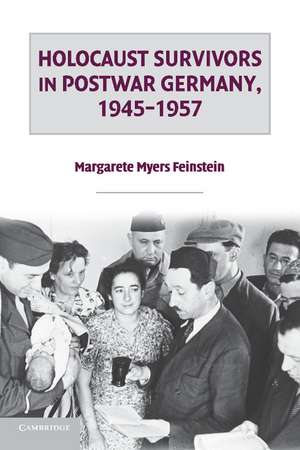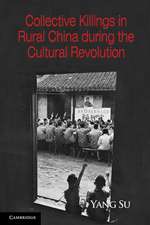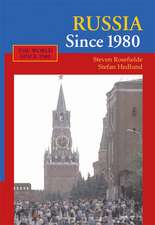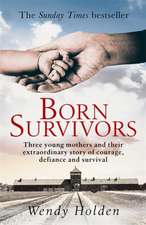Holocaust Survivors in Postwar Germany, 1945–1957
Autor Margarete Myers Feinsteinen Limba Engleză Paperback – 16 iul 2014
| Toate formatele și edițiile | Preț | Express |
|---|---|---|
| Paperback (1) | 328.56 lei 6-8 săpt. | |
| Cambridge University Press – 16 iul 2014 | 328.56 lei 6-8 săpt. | |
| Hardback (1) | 697.62 lei 6-8 săpt. | |
| Cambridge University Press – 27 dec 2009 | 697.62 lei 6-8 săpt. |
Preț: 328.56 lei
Nou
Puncte Express: 493
Preț estimativ în valută:
62.87€ • 65.82$ • 52.02£
62.87€ • 65.82$ • 52.02£
Carte tipărită la comandă
Livrare economică 05-19 aprilie
Preluare comenzi: 021 569.72.76
Specificații
ISBN-13: 9781107670198
ISBN-10: 1107670195
Pagini: 342
Ilustrații: 16 b/w illus.
Dimensiuni: 235 x 155 x 20 mm
Greutate: 0.53 kg
Editura: Cambridge University Press
Colecția Cambridge University Press
Locul publicării:New York, United States
ISBN-10: 1107670195
Pagini: 342
Ilustrații: 16 b/w illus.
Dimensiuni: 235 x 155 x 20 mm
Greutate: 0.53 kg
Editura: Cambridge University Press
Colecția Cambridge University Press
Locul publicării:New York, United States
Cuprins
Introduction; 1. Bamidbar: in the wilderness; 2. The living and the dead; 3. The new Jewish man and woman; 4. Guarantors of the future: DP children; 5. Performing identity and building community; 6. Out of the wilderness; Conclusion.
Recenzii
'Margarete Myers Feinstein's Holocaust Survivors in Postwar Germany is a wonderful book. Meticulously researched and well written it tells the compelling story of the immediate post-liberation years in which Holocaust survivors returned to life - to Jewish life in social, political, religious, cultural and above all personal terms. … Anyone reading Feinstein's work will understand that the immediate postwar years were pivotal and Feinstein offers us unique access to that time and place.' Michael Berenbaum, American Jewish University
'This is a compelling account of everyday life among the Holocaust survivors. Margarete Myers Feinstein presents a rich array of personal narratives and archival sources, and thus provides the Jewish Displaced Persons in postwar Germany with a powerful posthumous voice.' Michael Brenner, University of Munich
'The story of the victims of the Holocaust did not end with liberation. Margarete Myers Feinstein demonstrates how victims became survivors and how survivors took responsibility for their own lives after the tragedy that had befallen them. Their decisions in memorializing the past, living in the present, and preparing for the future played a crucial role in their psychological and physical rehabilitation. This book will serve as an illuminating epilogue to the history of the Holocaust and the first chapter in a new history of the Jews after the catastrophe.' Jay Howard Geller, University of Tulsa
'Margarete Myers Feinstein has written a vivid new chapter in the history of the German Jews and of Jews in Germany. It is the post-Holocaust history of a third of a million Jewish survivors, whose presence on the soil of defeated Germany was heavy with significance both for the traumatized Jews and the morally bankrupt Nazis. Feinstein reconstructs a Jewish rebirth and self-empowerment indiscernible in a previous scholarship that cast the Jewish DPs as pawns in the political strategies of outsiders to their ranks. Her book is an impressive tribute to human beings' powers of collective cultural and social recovery from murderous assault. It demonstrates, too, the enormous strength of Judaism and Jewish identity.' William Hagen, University of California at Davis
'This book succeeds in documenting the wide variety of ways in which Jewish DPs employed Jewish traditions to assign new meaning to their lives after the Holocaust … the book offers a compelling 'history of everyday life' in the DP camps. The book will represent an important point of reference for any further study of Jewish life in post-Holocaust Germany.' The Journal of Central European History
'A consummate history of everyday life, this study affords remarkably detailed insight into a crucial moment of transition into a postwar world.' German History
'… Myers Feinstein's book makes a valuable contribution to the field.' East European Jewish Affairs
'This is a well written and carefully constructed analysis that has much to recommend it in providing an understanding of how the Jewish survivors of the Holocaust rebuilt their lives and their sense of identity in the postwar world.' European History Quarterly
'This is a compelling account of everyday life among the Holocaust survivors. Margarete Myers Feinstein presents a rich array of personal narratives and archival sources, and thus provides the Jewish Displaced Persons in postwar Germany with a powerful posthumous voice.' Michael Brenner, University of Munich
'The story of the victims of the Holocaust did not end with liberation. Margarete Myers Feinstein demonstrates how victims became survivors and how survivors took responsibility for their own lives after the tragedy that had befallen them. Their decisions in memorializing the past, living in the present, and preparing for the future played a crucial role in their psychological and physical rehabilitation. This book will serve as an illuminating epilogue to the history of the Holocaust and the first chapter in a new history of the Jews after the catastrophe.' Jay Howard Geller, University of Tulsa
'Margarete Myers Feinstein has written a vivid new chapter in the history of the German Jews and of Jews in Germany. It is the post-Holocaust history of a third of a million Jewish survivors, whose presence on the soil of defeated Germany was heavy with significance both for the traumatized Jews and the morally bankrupt Nazis. Feinstein reconstructs a Jewish rebirth and self-empowerment indiscernible in a previous scholarship that cast the Jewish DPs as pawns in the political strategies of outsiders to their ranks. Her book is an impressive tribute to human beings' powers of collective cultural and social recovery from murderous assault. It demonstrates, too, the enormous strength of Judaism and Jewish identity.' William Hagen, University of California at Davis
'This book succeeds in documenting the wide variety of ways in which Jewish DPs employed Jewish traditions to assign new meaning to their lives after the Holocaust … the book offers a compelling 'history of everyday life' in the DP camps. The book will represent an important point of reference for any further study of Jewish life in post-Holocaust Germany.' The Journal of Central European History
'A consummate history of everyday life, this study affords remarkably detailed insight into a crucial moment of transition into a postwar world.' German History
'… Myers Feinstein's book makes a valuable contribution to the field.' East European Jewish Affairs
'This is a well written and carefully constructed analysis that has much to recommend it in providing an understanding of how the Jewish survivors of the Holocaust rebuilt their lives and their sense of identity in the postwar world.' European History Quarterly
Notă biografică
Descriere
This book give a voice to Holocaust survivors, using survivor memoirs and interviews, and focusing on the personal aspects of the transition to normalcy.














